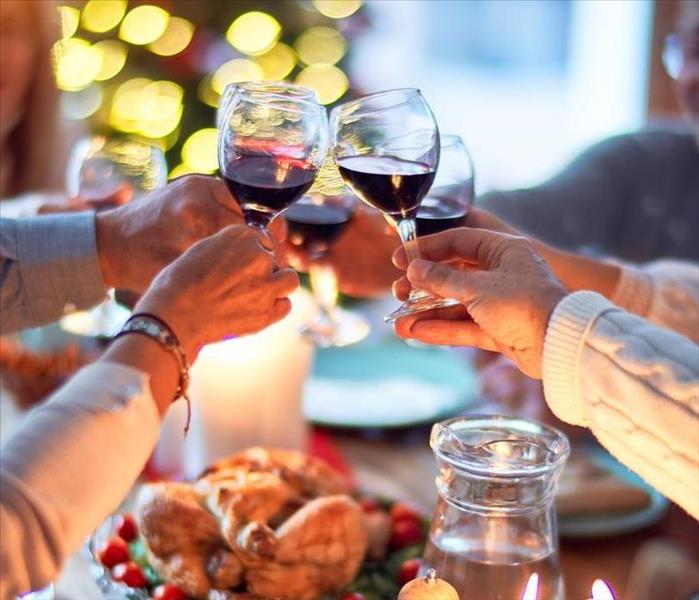The Responsible Host’s Fire Safety Guide for Thanksgiving Day
11/17/2022 (Permalink)
Being aware of the possibility of fires, practicing safety measures to prevent fires, and knowing what to do in the event of a fire are important responsibilities for anyone who is hosting a Thanksgiving celebration.
As you prepare for the upcoming Thanksgiving Holiday and begin to plan the details for your gathering, be it big or small, exuberant or relaxing, there are several safety tips to keep in mind to promote a safe environment for you, your family, and/or your friends (and your furry family too!).
How likely am I to have a fire on Thanksgiving Day?
According to The U.S. Fire Administration, cooking fires cause the most Thanksgiving Day fires in residential buildings, occurring more often on Thanksgiving Day than any other day of the year. On Thanksgiving Day, 74% of fires in residential buildings were caused by cooking followed by 8% of fires caused by heating. By comparison, cooking caused 51% of residential fires that occurred on all days of the year other than Thanksgiving. Over half (54%) of Thanksgiving Day fires occur between 10 a.m. and 5 p.m. when people are preparing Thanksgiving dinner.
Tips for preventing kitchen fires.
- Never leave your range or cooktop unattended while cooking. If you have to leave the room, turn your range or cooktop off.
- Wear short, close-fitting or tightly rolled sleeves. Loose clothing can hang down onto hot surfaces and can catch fire if it comes in contact with a gas flame or electric burner.
- Keep your cooking area clean and free of combustible materials. Food wrappers, oven mitts or other materials left on or near the stove may catch fire.
- Be sure to clean up any spilled or splattered grease. Built-up grease can catch fire in the oven or on the cooktop.
- Keep a fire extinguisher readily available. Having an extinguisher nearby is important, but you also need to have the correct type of extinguisher and know how to properly use it.
- Never throw hot grease in the garbage as it can ignite combustible materials. Be sure to let grease cool and consider disposing it in an old can, such as a metal coffee can.
- Do not store food or other items in your oven. It can be easy to forget there is an item in your oven, and this could catch fire while preheating.
What to Do If a Cooking Fire Flares Up
By exercising caution in your kitchen, you can help reduce the risk of a kitchen fire. But if a fire does flare up, you need to be prepared.
- Your safety comes first. If you cannot safely extinguish the fire, leave the scene, call 911 for help, and let the fire department control the fire.
- If a small fire flares up and you are going to try to extinguish it, call 911 for help first. A fire may grow out of control more quickly than you anticipate. It is safer to have help already on the way.
- Smother a grease fire – never throw water on a grease fire. The water can be superheated and change to steam, and can cause severe burns. Also, it can cause oil to splash up and spread the fire. If a grease fire starts in a pan, smother the flames by sliding the lid – while wearing an oven mitt – over the pan. If it is safe to do so, turn off the heat source. Do not move the pan; keep the lid on until the fire is out and the pan is completely cool.
- If a fire starts in your oven, KEEP THE DOOR CLOSED & TURN OFF THE HEAT SOURCE. Keeping the door closed will help smother the flames. Do not open the door until the flames are completely out.
- If a fire starts in your microwave, turn off the microwave and do not open it until the fire is completely out. Unplug the microwave only if you can safely do so.
With these safety precautions in place and the knowledge of how to handle a kitchen fire, you are one step closer to being a responsible host.
Cheers and Happy Thanksgiving
to all of you responsible hosts out there!
From SERVPRO of North Knoxville
Was this helpful? Leave us a review to let us know!
https://www.wereyouhappy.com/review2/SERVPRO-of-north-knoxville






 24/7 Emergency Service
24/7 Emergency Service
